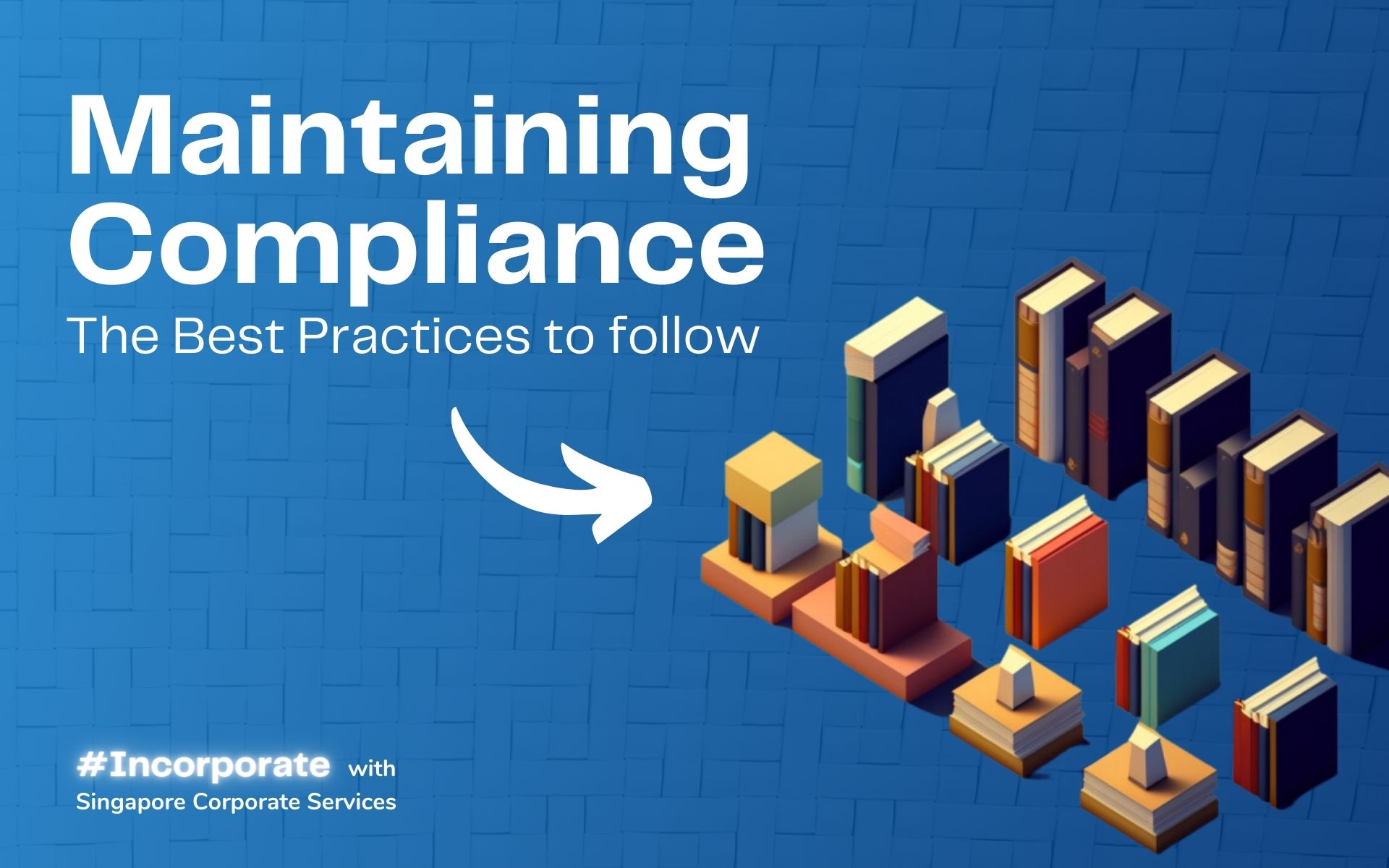
Compliance with regulations is a critical component of long-term success for businesses in Singapore.
Incorporated businesses must adhere to a wide range of legal requirements to operate, including accounting standards, tax regulations, and employment laws, among others. Non-compliance can lead to penalties or legal action, making it vital for businesses to maintain compliance with all relevant regulations. Here are some best practices for incorporated businesses in Singapore to follow to ensure compliance.
Understand the Key Regulations and Standards
One of the first best practices for maintaining compliance is to have a clear understanding of the regulations and standards that your business must comply with. These include accounting standards, tax regulations, employment laws, data protection rules, and other applicable regulations. It is essential to regularly review these regulations and standards and ensure that your business is following them.
There are several resources available for understanding the key regulations and standards in Singapore:
- The government agency responsible for each regulation, such as the Accounting and Corporate Regulatory Authority (ACRA) for accounting and the Ministry of Manpower (MOM) for employment regulations. These agencies provide guides, FAQs, and other resources on their websites to help businesses comply with their regulations.
- Another resource is the Singapore Business Federation (SBF), which provides various resources to help businesses navigate legal and regulatory issues. The SBF offers training and events on regulatory compliance, publications on legal and regulatory changes, and consultations with regulatory experts.
- Other resources include accounting and corporate services firms like Singapore Corporate Services that specialise in regulatory compliance. These firms provide services to assist businesses in staying up-to-date with regulations.
Adopt Accurate Record-Keeping and Reporting Practices
Accurate record-keeping and reporting practices are essential for ensuring compliance with regulations. These practices allow you to keep track of financial transactions, employment processes, and other activities required by regulations. Additionally, maintaining accurate records and reports assists in identifying potential compliance issues early and correcting them before they become problematic.
Here are three ways businesses can adopt accurate record-keeping and reporting practices:
- Use accounting software: Businesses can use accounting software to keep track of financial transactions accurately. This software can generate financial reports that help businesses understand their financial position and meet regulatory requirements.
- Have a documented record-keeping policy: Businesses can develop a documented record-keeping policy that outlines the type of documents to be recorded, retention periods, and other relevant record-keeping practices. This policy should be communicated to all employees, and regular training should be provided to understand and follow it.
- Regularly review and reconcile accounts: Businesses should monitor their accounts regularly to ensure that all transactions are recorded accurately and reconciled with the bank and other financial statements. Regular reviews prevent errors and discrepancies, and they also help identify areas that may need improved record-keeping practices.
Develop Internal Policies and Procedures
In addition to understanding the regulations and standards, businesses in Singapore should also develop internal policies and procedures that align with these regulations. These policies and procedures should outline the steps that employees must follow to ensure compliance with regulatory requirements. It is vital to communicate these policies and procedures clearly to all employees and provide regular training to ensure that they are followed consistently.
- Conduct a comprehensive audit of current practices: Before developing internal policies and procedures, businesses should conduct a comprehensive audit of their current operations. This audit should identify areas where the business may be at risk of non-compliance with regulations. The results of this audit can provide a roadmap for developing internal policies and procedures.
- Involve relevant stakeholders in creating policies and procedures: Businesses should involve relevant stakeholders in developing internal policies and procedures. This includes employees, management, legal and regulatory experts, and other relevant parties. Involving stakeholders ensures consensus on the internal policies and procedures and can increase adherence to them.
- Regularly review and update policies and procedures: The regulatory environment is constantly changing, and internal policies and procedures must keep pace. Businesses should regularly review and update their internal policies and procedures. This ensures that they remain relevant and aligned with current regulations and standards. Additionally, businesses must communicate these updates to all employees and provide training on any changes that need to be implemented.
Implement Regular Compliance Audits
Conducting compliance audits regularly can assist your company in spotting potential compliance issues before they result in penalties or legal action. Audits should review all aspects of your business that are regulated, including financial transactions and employment practices. It is critical to have a clear plan to deal with any compliance issues identified during an audit promptly.
Here are three ways businesses can implement regular compliance audits:
- Develop a comprehensive compliance audit plan: A compliance audit plan should outline the scope of the audit, the timing of the audit, and the internal and external audit resources needed. This plan should align with relevant regulations, standards, and company internal policies and procedures.
- Conduct frequent compliance reviews: Compliance reviews should be conducted frequently to identify potential risks, non-conformance or deviations from regulatory requirements. This review should cover all aspects of the business that are regulated, including financial transactions, employment practices, and any other areas that require compliance. Conducting frequent compliance reviews can help identify issues before they result in penalties or legal action.
- Establish an effective corrective action process: When compliance issues are identified, an effective corrective action process should be followed to address the identified issues. This may include updating relevant policies and procedures, providing additional training to employees, or revisiting the standard operating procedures. The corrective action process should ensure that the necessary actions are taken promptly to correct the issue and that steps are taken to prevent such issues in the future. Regular reviews of the corrective action process should be conducted to identify areas for improvement.
Respond to Breaches of Compliance Promptly
Breaches of compliance can occur despite a company’s best efforts. The key is to respond to these breaches promptly and take appropriate action to correct them. It is critical to have a clear policy in place that outlines the steps your company should take in the event of a compliance breach. These policies should also include measures to prevent similar breaches from occurring in the future.
- Conduct a thorough investigation: In the event of a breach of compliance, businesses should conduct a thorough investigation of the issue to identify the root cause of the breach and assess the extent of the impact. It is essential to review all relevant policies and procedures to ensure they are effective and review the steps leading up to the breach.
- Implement Corrective Actions: Once a thorough investigation is conducted and the root cause of the breach is identified, businesses should implement corrective actions. This can include a wide range of modifications to policies, procedures, processes, or training. These actions should aim to prevent similar breaches from happening in the future.
- Report the breach to the relevant authorities: In Singapore, some breaches of compliance are reportable to the relevant regulatory authorities. It is essential to report any breaches to the relevant authorities as soon as possible and provide accurate information about what has happened, and what corrective action has been taken. Reporting the breach promptly can help mitigate further repercussions and show that the business is cooperating with the authorities while seeking a solution.
Conclusion
Maintaining compliance is an integral part of business operations in Singapore. By following these best practices, businesses can ensure that they are compliant with all relevant regulations, avoiding the risk of penalties and legal action. Adopting accurate record-keeping and reporting practices, developing internal policies and procedures, implementing regular compliance audits and responding promptly to breaches of compliance can ensure that your business maintains a successful future in Singapore.
Corporate Income Tax Malaysia: Rates, Filing, and Strategic Compliance
Understand Malaysia’s corporate income tax system. Learn current tax rates, SME tiers, filing deadlines, LHDN requirements, penalties, and more.
Understanding the Core Types of Audits and Their Roles in Accounting in Singapore
Learn the key types of audits in Singapore to build trust and stay compliant. Examples are statutory, internal, GST, and forensic.
Tax Return In Singapore: A Friendly 2025 Guide
Want to be a responsible business owner? Read this guide to tax return in Singapore to help understand tax filing and play your part.



